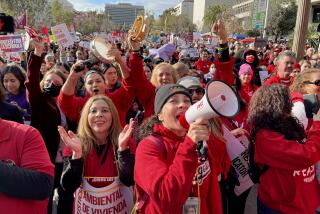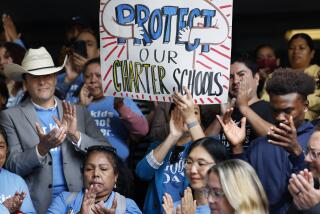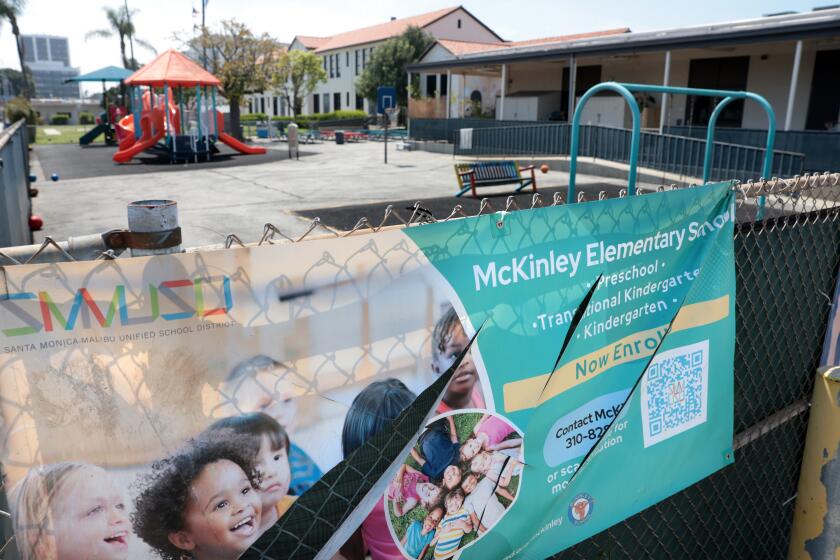New L.A. school board members are sworn in, but old challenges remain
Before choosing Steve Zimmer as their new president, L.A. school board members gave him a lecture: He would need to build consensus, welcome those with differing politics and varying approaches to education, and speak for them as a whole.
Their admonishments made it clear that the seven-member board remained split by sharp differences on how to confront an array of challenges — particularly as two new members were sworn in Wednesday.
The new board includes charter school co-founder Ref Rodriguez, who replaces teachers union ally Bennett Kayser, the board’s most unrelenting critic of charter schools. And Scott Schmerelson, a teachers union-backed retired principal, defeated incumbent Tamar Galatzan, an opponent of the union on key issues.
The board faces pressing issues in the nation’s second-largest school system — chief among them, the selection of a new superintendent. But first the board members acknowledged personal and policy disparities.
“I do believe the board president will have to do some healing and bringing together,” Zimmer said.
The divides on the Board of Education reflect differences and doubts in the wider community, said Charles Kerchner, a professor in the school of educational studies at Claremont Graduate University.
The Los Angeles Unified School District “faces an existential problem that people have lost confidence in the district’s ability to solve its problems and create a sense of excitement about the many good things that are going on,” Kerchner said. “If this continues, there will be increasingly forceful calls to break up the district or radically alter its governance.”
In coming months, the board will deal with an improved but limited budget, one that includes long-awaited pay raises but also layoffs. Sweeping academic challenges also persist, including the need to revamp the college prep program so that more students graduate. The district also has yet to resolve two technology debacles: a faulty student records system and an aborted plan to provide every student, teacher and campus administrator with an iPad.
Some analysts say the two incumbents lost their seats in large measure because opponents associated them with the costly iPad project, which became the target of an FBI investigation. Galatzan was an early supporter and Kayser, though a frequent critic, took a similar beating in campaign materials. The iPad effort had been a major initiative of former Supt. John Deasy, who resigned under pressure in October.
The new board represents an ideological shuffling, especially concerning charter schools, which are independently operated and exempt from some rules that govern traditional campuses. Most charters are nonunion, and the teachers union has sought to limit their growth.
The effect and oversight of charters could be a point of conflict.
But Rodriguez indicated he would collaborate with his colleagues.
“I will do everything in my power to ensure that we are unified,” he said at the swearing-in ceremony at the Roybal Learning Center.
He implied that it was time to move beyond a vitriolic campaign that left bitter feelings between his supporters and those of Kayser, who included Zimmer.
George McKenna, who won his first full term in May after winning a special election in August, and Richard Vladovic, who won a third term, also took the oath of office.
The task of choosing a superintendent has become especially pressing since Ramon Cortines, who came out of retirement after Deasy’s resignation, said he would prefer to leave by the end of the year. The previous board, pleased with Cortines’ work, had put off any moves until the new members were seated.
The choice is about more than finding a capable administrator. By choosing Deasy, for example, the board had, in effect, opted for a particular direction in reforms, one that included the controversial use of test scores as one element in a teacher’s evaluation.
The selection of the next superintendent is as much about philosophy as managerial competence. On that, the previous board — and five of seven members are returning — often struggled to find common ground on policy. The two new members are championed by vastly different constituencies, even though they all said they shared the same priority — the best interests of students.
Vladovic could not continue as board president because of a rule barring more than two consecutive one-year terms. Some board members had tried to change the rule — and thwart Zimmer — but failed.
So board members lectured Zimmer instead. Although the formal vote for Zimmer was unanimous, insiders said his appointment was based on a 4-3 majority, which included his own vote.
Monica Ratliff said she wanted the president to speak for the entire board but without getting ahead of it, while also acting transparently, without making alliances behind the scenes.
Monica Garcia reminded him that the position was “an opportunity to say out loud what we’re trying to do,” adding that “when we make comments about our beliefs,” the views of the board president “get picked up at national and local levels in the way that individual voices do not.”
Schmerelson talked about the need to be “open, sincere, even-tempered.”
In an interview, Vladovic said he tried to bring the board together around important issues, such as support for Cortines and the successful resolution of contract negotiations with teachers.
Critics have questioned whether that deal is affordable, but Vladovic insisted it is — provided that all sides commit to solving long-term problems, such as how to keep paying for retiree health benefits.
“I tried to tone down the animus on the board even when there were strong feelings,” he said. “I’m not an ideologue.”
During his time in office, Zimmer has become more closely associated with the teachers union, especially after he relied on union backing to win reelection two years ago. One of his first moves Wednesday was to appoint a liaison between the board and labor groups. He asked Vladovic to serve in that role.
Schmerelson supporter Brent Smiley, who taught at a school where the new board member was principal, said he was hopeful.
“My sense was the school board members didn’t like each other very much, and bringing people together is Scott’s strength,” Smiley said.
howard.blume@latimes.com
Twitter: @howardblume
More to Read
Start your day right
Sign up for Essential California for news, features and recommendations from the L.A. Times and beyond in your inbox six days a week.
You may occasionally receive promotional content from the Los Angeles Times.







